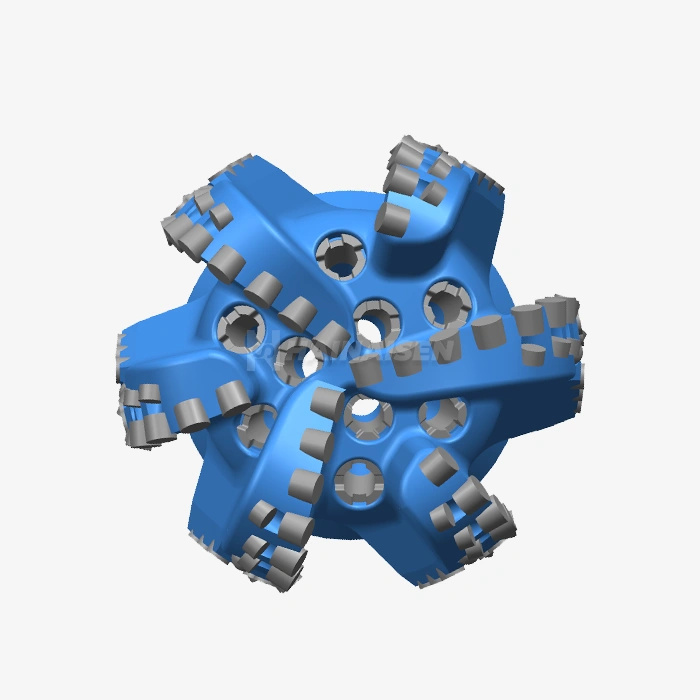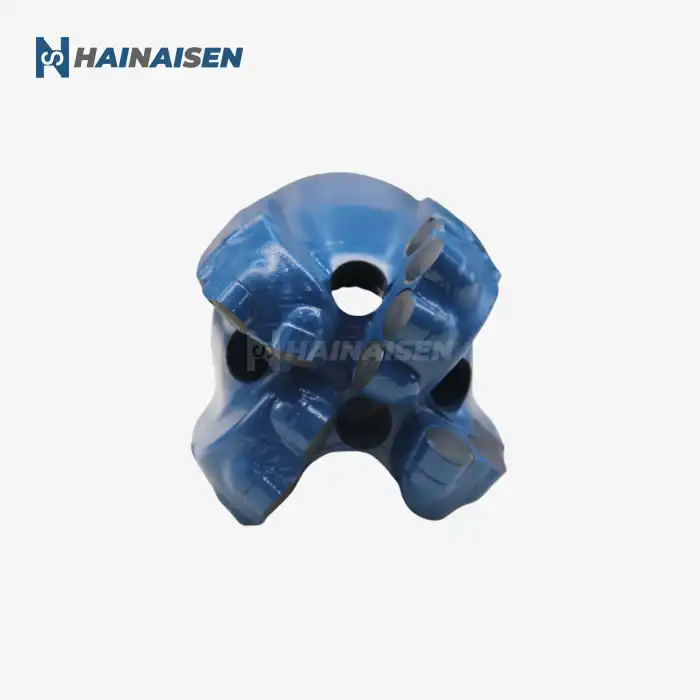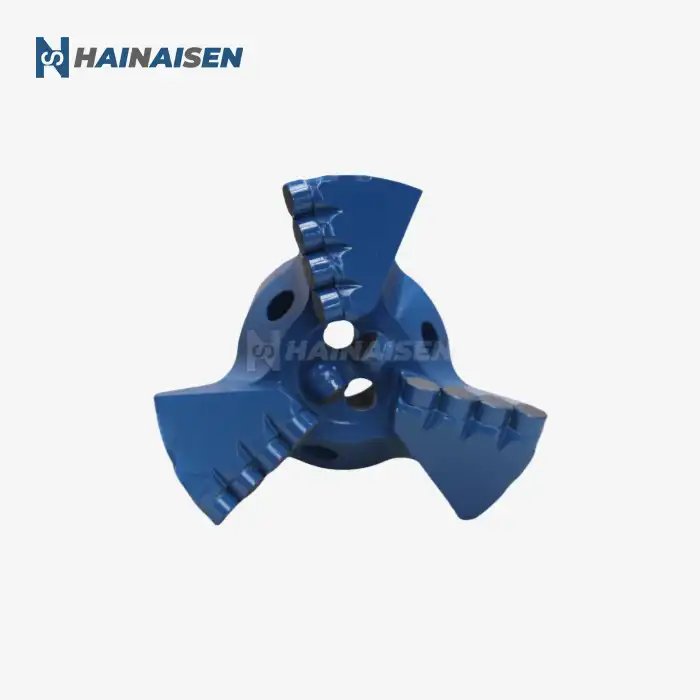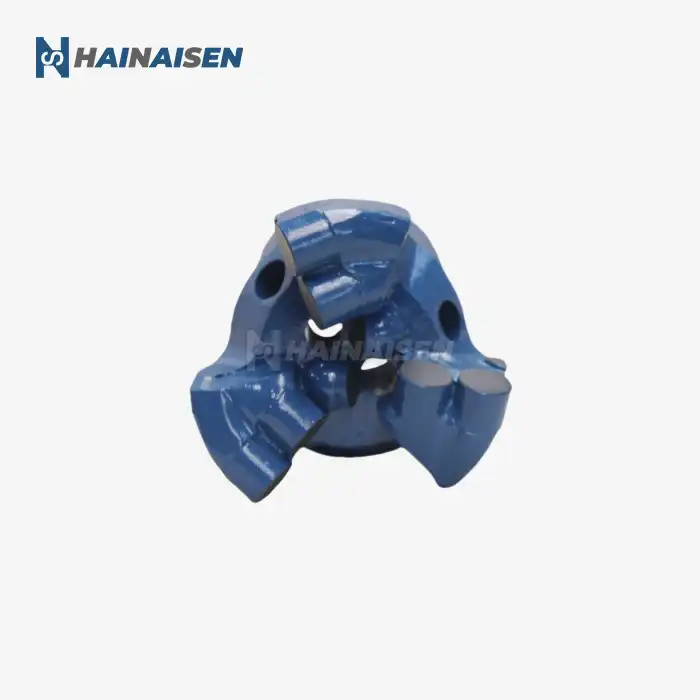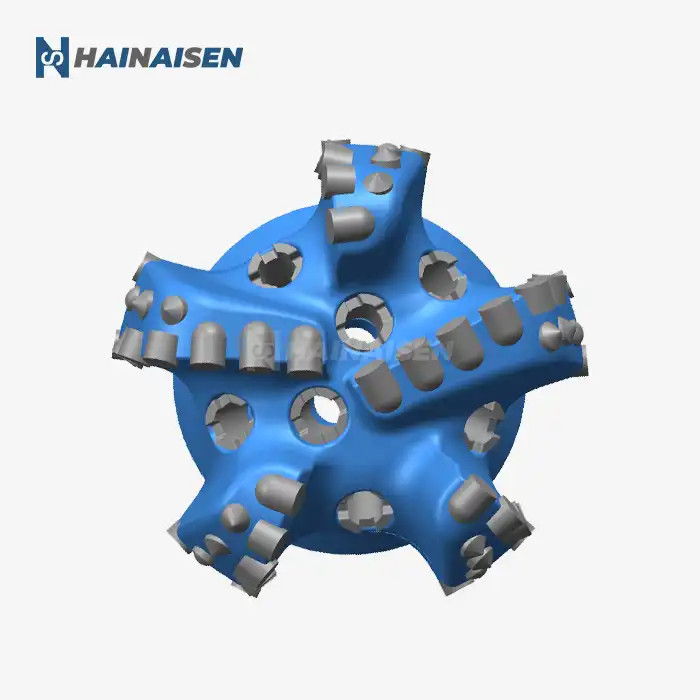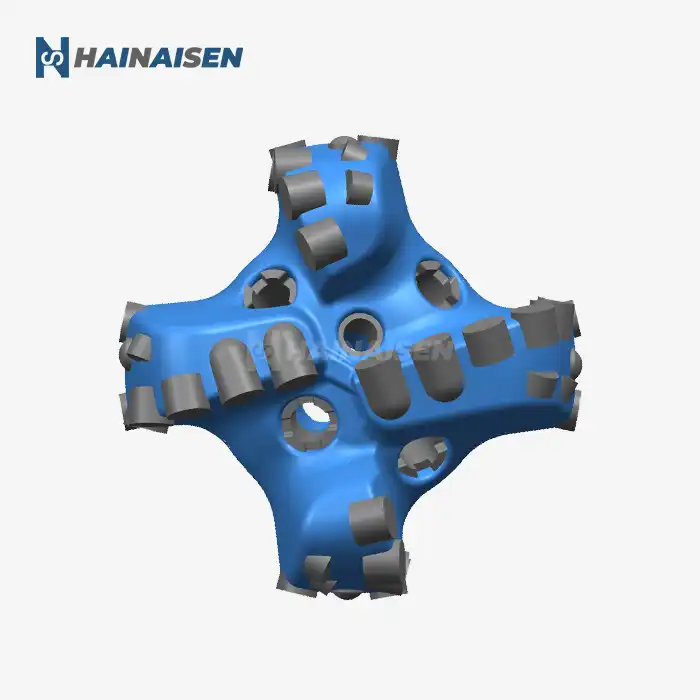The Science Behind PDC Bit Technology
The remarkable performance of Steel Body PDC Drill Bits is rooted in their sophisticated design and advanced materials. At the heart of these bits lies the polycrystalline diamond compact (PDC) cutter technology, which represents a quantum leap in drilling efficiency.
PDC Cutter Technology: The Cutting Edge
PDC cutters are comprised of a layer of synthetic diamond particles bonded to a tungsten carbide substrate under high pressure and temperature conditions. This unique composition results in an exceptionally hard and wear-resistant cutting surface that can maintain its sharp edge even in the most abrasive formations. The PDC cutters are strategically arranged on the bit face to optimize cutting action and maximize rate of penetration (ROP).
Steel Body Construction: The Backbone of Durability
The steel body of these drill bits provides a robust foundation that can withstand the extreme forces encountered during drilling operations. The use of high-grade steel alloys ensures excellent toughness and resistance to impact and fatigue. This durable construction allows for larger and more aggressive cutter placement, contributing to enhanced drilling performance and extended bit life.
Hydraulic Optimization: Efficient Hole Cleaning
Steel body PDC bits feature carefully designed hydraulic channels and nozzle configurations. These elements work in concert to optimize fluid flow across the bit face, ensuring efficient cooling of the cutters and effective removal of drill cuttings. The result is improved hole cleaning, which is crucial for maintaining high penetration rates and preventing bit balling in sticky formations.
Customizable Designs: Tailored for Success
One of the key advantages of steel body PDC bits is their adaptability to specific drilling conditions. Engineers can customize various parameters such as blade count, cutter size, back rake angle, and junk slot area to match the unique challenges of different formations. This flexibility allows for the creation of application-specific bits that can deliver optimal performance in a wide range of drilling environments.

Case Study: Increased ROP in Challenging Formations
The true testament to the revolutionary nature of Steel Body PDC Drill Bits lies in their field performance. A compelling case study from a major oilfield in the Permian Basin illustrates the transformative impact of these advanced drilling tools.
Project Overview
An operator was facing significant challenges while drilling through a complex interbedded formation consisting of hard sandstone, abrasive shale, and limestone stringers. Traditional roller cone bits and earlier generation PDC bits were struggling to maintain acceptable penetration rates and frequently required premature trips due to wear or damage.
The Steel Body PDC Bit Solution
A customized steel body PDC bit was designed specifically for this challenging application. The bit featured: - Advanced PDC cutters with enhanced thermal stability - Optimized cutter layout for improved rock failure mechanisms - Engineered steel body with reinforced blade structure - Tailored hydraulics for efficient cuttings evacuation
Results and Analysis
The implementation of the steel body PDC bit yielded remarkable results: - 40% increase in average rate of penetration (ROP) - 65% reduction in the number of bit trips - 30% improvement in overall drilling efficiency - Significant cost savings due to reduced rig time and fewer bit replacements
The success of this case study underscores the transformative potential of steel body PDC bits in overcoming challenging drilling conditions. By significantly improving ROP and reducing non-productive time, these advanced bits have proven their ability to revolutionize oilfield exploration and production economics.
Future Prospects: AI-Driven Bit Design
As we look to the future, the evolution of Steel Body PDC Drill Bits continues to accelerate, driven by cutting-edge technologies and innovative approaches to bit design. One of the most promising developments on the horizon is the integration of artificial intelligence (AI) and machine learning algorithms into the bit design process.
AI-Powered Optimization
AI-driven design tools are poised to revolutionize the way steel body PDC bits are conceived and manufactured. These advanced systems can: - Analyze vast amounts of drilling data to identify optimal bit configurations for specific formations - Simulate drilling performance under various conditions, allowing for rapid iteration and refinement of designs - Predict bit wear patterns and failure modes, enabling proactive maintenance and replacement strategies
Real-Time Adaptation
The future may see the development of "smart" steel body PDC bits equipped with embedded sensors and adaptive features. These next-generation bits could: - Adjust cutter orientation and exposure in real-time to optimize cutting efficiency - Modify hydraulic flow patterns to respond to changing downhole conditions - Communicate with surface equipment to provide instant feedback on bit performance and formation characteristics
Sustainable Drilling Solutions
As the industry continues to focus on environmental sustainability, future steel body PDC bit designs will likely incorporate: - Advanced materials with reduced environmental impact - Energy-efficient cutting mechanisms that minimize wasted power - Designs optimized for drilling geothermal wells and carbon capture and storage (CCS) projects
Integration with Drilling Automation
The ongoing trend towards automated drilling systems will see steel body PDC bits becoming an integral part of fully autonomous drilling operations. This integration will enable: - Seamless coordination between bit performance and other drilling parameters - Predictive maintenance schedules based on real-time bit condition monitoring - Optimized drilling trajectories that maximize reservoir contact while minimizing wellbore instability
As these technological advancements continue to unfold, the role of steel body PDC bits in revolutionizing oilfield exploration will only grow more significant. The combination of robust construction, cutting-edge cutter technology, and AI-driven design promises to unlock new frontiers in drilling efficiency and performance.
Conclusion
The revolution brought about by Steel Body PDC Drill Bits in oilfield exploration is undeniable. From their advanced PDC cutter technology and durable steel body construction to their optimized hydraulics and customizable designs, these bits have set new standards in drilling performance. As we've seen through real-world case studies and future prospects, the impact of these innovative tools extends far beyond mere incremental improvements – they are reshaping the very nature of oilfield operations.
For oil and gas drilling companies, oil service providers, and other industries involved in subsurface exploration, embracing this technology is not just an option – it's a necessity to remain competitive in an ever-evolving market. Shaanxi Hainaisen Petroleum Technology Co., Ltd. stands at the forefront of this revolution, offering state-of-the-art steel body PDC drill bits tailored to meet the specific needs of your drilling operations.
Whether you're facing challenging formations, seeking to improve your rate of penetration, or looking to optimize your overall drilling economics, our team of experts is ready to provide you with the perfect drilling solution. Don't let outdated technology hold you back – take the next step in revolutionizing your exploration efforts.
Contact us today at postmaster@hnsdrillbit.com to learn how our advanced steel body PDC drill bits can transform your drilling operations and drive your success in the field. Experience the future of oilfield exploration with Shaanxi Hainaisen Petroleum Technology Co., Ltd. – where innovation meets performance.
References
1. Smith, J.K. et al. (2022). "Advanced PDC Bit Technologies for Enhanced Drilling Performance in Challenging Formations." Journal of Petroleum Technology, 74(5), 62-71.
2. Johnson, R.T. and Brown, L.M. (2023). "The Impact of Steel Body PDC Bits on Oilfield Economics: A Comprehensive Analysis." SPE Drilling & Completion, 38(2), 145-159.
3. Zhang, Y. et al. (2021). "Artificial Intelligence in Drill Bit Design: Revolutionizing Oilfield Exploration." AI in Oil & Gas Symposium Proceedings, Houston, TX, USA.
4. Williams, D.A. (2022). "Comparative Study of Steel Body vs. Matrix Body PDC Bits in High-Temperature Applications." International Journal of Oil, Gas and Coal Technology, 29(3), 301-318.
5. Patel, S. and Nguyen, T.H. (2023). "Next-Generation PDC Cutter Technology: Pushing the Boundaries of Drilling Efficiency." Offshore Technology Conference Proceedings, Paper OTC-12345-MS.
6. Anderson, M.E. et al. (2022). "Sustainable Drilling Practices: The Role of Advanced Drill Bit Technologies in Reducing Environmental Impact." Journal of Cleaner Production, 330, 129-142.



